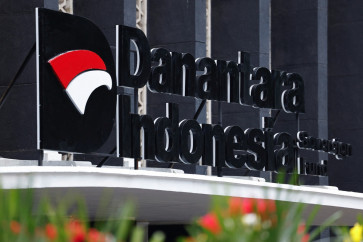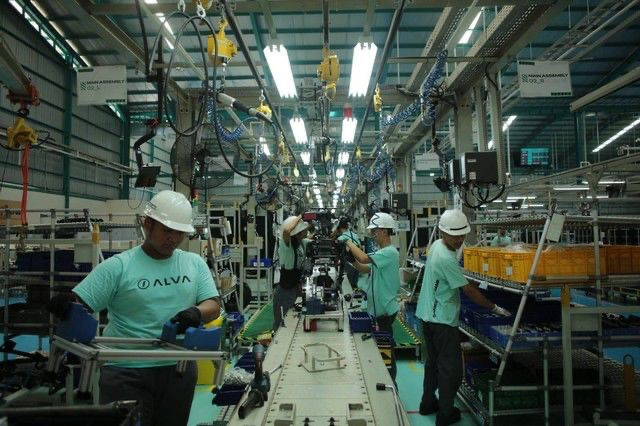Popular Reads
Top Results
Can't find what you're looking for?
View all search resultsPopular Reads
Top Results
Can't find what you're looking for?
View all search resultsBarito allocates $25 million to sustain growth
Diversified company PT Barito Pacific, founded by Indonesian tycoon Prajogo Pangestu, has set aside US$25 million in capital expenditure this year to support the development of its plantation business subsidiary, which is expected to help the company maintain stable growth within the fluctuating petrochemical sector
Change text size
Gift Premium Articles
to Anyone
D
iversified company PT Barito Pacific, founded by Indonesian tycoon Prajogo Pangestu, has set aside US$25 million in capital expenditure this year to support the development of its plantation business subsidiary, which is expected to help the company maintain stable growth within the fluctuating petrochemical sector.
Barito’s senior vice president for investor relations, Agustino Sudjono, said that around Rp 210 billion ($22 million) of the total expenditure would be allocated to its subsidiary PT Royal Indo Mandiri to develop two palm oil factories in West Kalimantan. Of the total allocation, 65 percent will be raised in loans from Bank Negara Indonesia (BNI) and 35 percent by internal cash.
“The remaining funds will be used for new plants and treatment facilities. We hope to complete the factories in the third quarter of next year,” Agustino said after the company’s annual shareholders’ meeting on Friday.
He said the first plant would have the capacity to process 30 tons of fresh palm fruit per hour while the second factory would process up to 60 tons per hour.
Through Royal Indo Mandiri, Barito currently controls 39,800 hectares of land ready for oil palm plantations, with a planted area of 10,450 hectares and a production area of 2,500 hectares. The company is planning to plant a further 2,000 hectares this year.
Planting 1 hectare of land will need around Rp 45 million plus Rp 15 million for infrastructure development, according to Royal Indo Mandiri president director Reza Andriansyah. He claimed that the company expected to reap 25 tons of palm fruit per hectare.
“The productive area was planted in 2008. We are expecting an increase in revenue from the higher production of the expanded productive areas this year and a further jump after our palm-oil factories are completed next year,” Reza said.
He said that Barito expected Royal Indo Mandiri to contribute up to Rp 30 billion to Baritos’ revenue this year, an almost six fold increase from Rp 5.6 billion last year.
“Next year, it will be about Rp 100 billion as we will no longer be selling only the fruit but also crude palm oil,” he said, adding that the product would be sold in the domestic market. Reza declined to reveal existing buyers.
Barito established a stake in the plantation business after acquiring Royal Indo Mandiri in 2010. Previously, the company had acquired petrochemical producer PT Chandra Asri along with its subsidiary PT Styrindo Mono Indonesia in 2007, which also marked Barito’s expansion from its core timber business into a diversified enterprise. In 2007, Barito also changed its name from the former PT Barito Pacific Timber.
In 2011, it decided to merge Chandra Asri and PT Tri Polyta Indonesia and renamed it PT Chandra Asri Petrochemicals, which currently has a 50 percent share in the domestic market. According to information available on the Indonesia Stock Exchange (IDX) website, Barito currently holds a 77.93 percent stake in Chandra Asri Petrochemicals, whose petrochemical sales contributed around 90 percent to its parent company’s revenue.
“Barito, as a holding company, makes investments in various industries, aiming to create a well-rounded portfolio. The petrochemical industry is very volatile, given the high prices of oil and naphtha. Therefore, the fluctuations in that industry need to be supported by different industries, such as palm oil,” Agustino said, commenting on his company’s performance outlook amid predictions that Chandra Asri Petrochemicals performance will be stagnant due to lower petrochemical prices.
Barito reported consolidated revenue of Rp 5.46 trillion from January to March, increasing by 10 percent from Rp 4.93 trillion in the same period last year. However, growing revenue costs and other expenses, including financial and administrative costs, saw the company report a net loss of Rp 158.29 billion in the first quarter of the year, a major setback compared to the net loss of Rp 60.37 billion for the same period last year.










